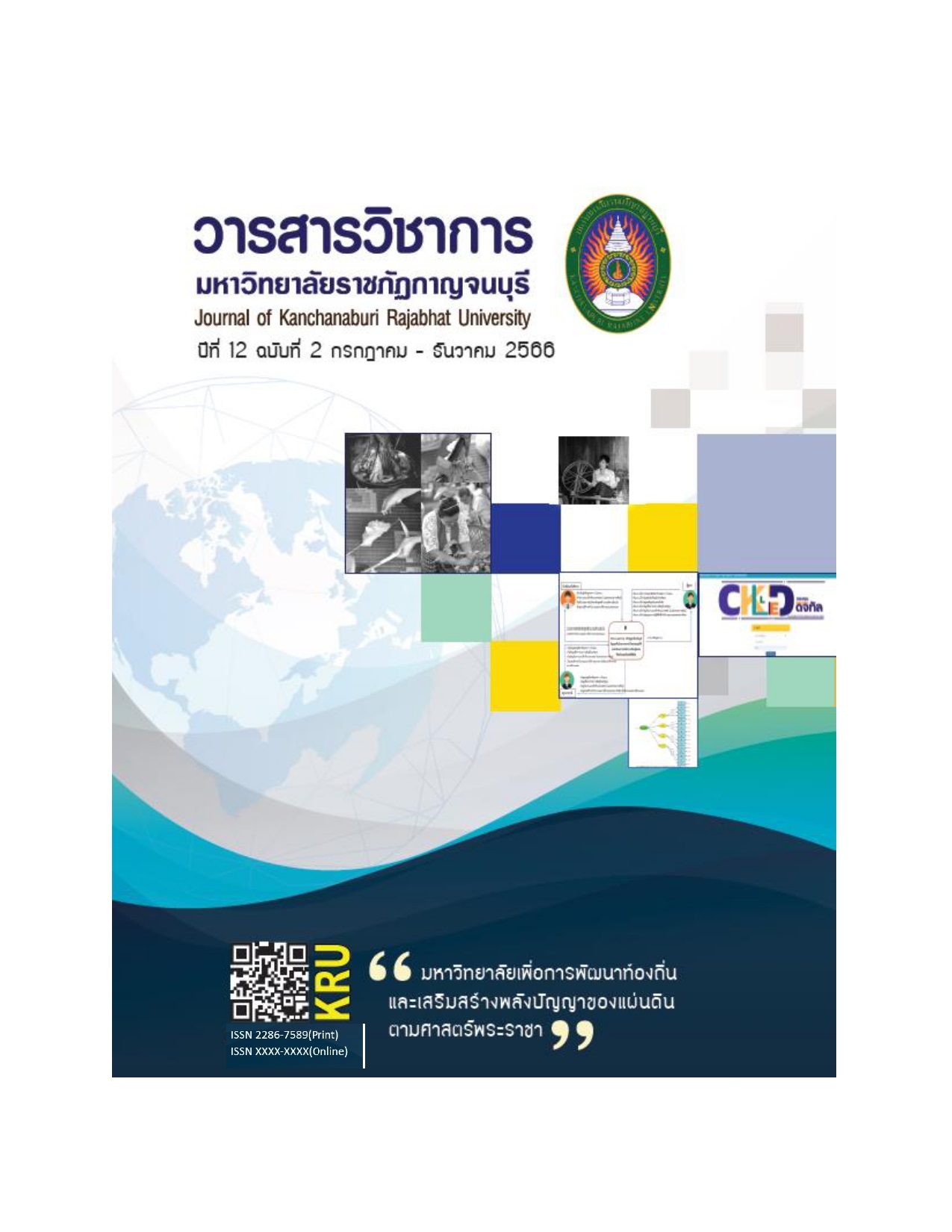ประเพณีจุลกฐิน “เส้นใยแห่งศรัทธา” ชุมชนพุตะเคียน ตำบลท่าเสา อำเภอไทรโยค จังหวัดกาญจนบุรี CHULAKATHIN CEREMONY “LIFELINES OF FAITH” PHUTAKHIAN COMMUNITY, THA SAO SUBDISTRICT, SAI YOK DISTRICT, KANCHANABURI PROVINCE
Main Article Content
Abstract
The ChulaKathin tradition of the Phutakian community was born from the power of faith
in Buddhism. It is a commitment to the community since the past. Due to the immigration of
many ethnic groups, including Karen, Mon and Tai Yuan, the community has become a
multicultural community. The Chulakathin shows their own beliefs in the society that connect
religion, nature and ways of interdependent life with perfectly blended religious ceremonies. Thus,
these become a part of wisdom, knowledge, ideas, abilities, and beliefs of the community.
From the study, it was found that the process of making Chulakathin clothes of the
Phutakhian community was outstanding and unique. The ritual of planting starts from preparing
the area, sowing the cotton seeds, collecting the cotton flowers, picking the cotton or taking the
seeds out of the cotton, flicking the cotton, spinning the cotton wheel or rolling the cotton, and
spinning cotton or pushing cotton. Moreover, the Chulakathin Weaving Ceremony starts from the
weaving of Chulakathin, cutting, and sewing of Chulakathin robes, dyeing clothes and parading the
Chulakathin robes. There are all valuable processes that consist of social and cultural knowledge
related to the people’s ways of life which constitute the foundation of community culture and
lead to the creation of value and the strengthening of society and culture, including the existence
of Buddhism, continuation of traditions, community identity creation through traditions, ritual and
relationship creation, communion through traditions and rituals, strengthening of education
through the creation of cultural learning resources, strengthening of the economy, especially
through the production rituals and the development of cultural capital from the community as
well as the promotion of cultural tourism.
Article Details

This work is licensed under a Creative Commons Attribution-NonCommercial-NoDerivatives 4.0 International License.
References
ชลทิตย์ เอี่ยมสาอางค์ และวิศนี ศิลาตระกูล. (2533). ภูมิปัญญาชาวบ้าน เทคโนโลยีพื้นบ้านและแหล่งวิทยากรในชุมชน. เอกสารการสอนชุดวิชาการพัฒนาและการใช้แหล่งวิทยากรในชุมชน . นนทบุรี:มหาวิทยาลัยสุโขทัยธรรมาธิราช.
ประยูร คลายโศก. (2539). พระพุทธศาสนากับการเปลี่ยนแปลงในสังคมไทยปัจจุบัน: ศึกษากรณีเปรียบเทียบประเพณีทอดกฐินของพุทธศาสนิกชนในเขตราษฎร์บูรณะ กรุงเทพฯ และอาเภอนางรอง จังหวัดบุรีรัมย์. วิทยานิพนธ์พุทธศาสตรมหาบัณฑิต สาขาวิชาพระพุทธศาสนา บัณฑิตวิทยาลัย มหาวิทยาลัยมหิดล.
เปลื้อง ณ นคร. (2522). พจนะ-สารานุกรม ฉบับทันสมัย เล่ม 1. กรุงเทพฯ: ไทยวัฒนาพานิช.
พรชัย ศรีสารคาม. (2535). กฐินแล่น. มหาสารคาม: สถาบันราชภัฏมหาสารคาม.
พระครูปลัดพิศิษฐ์ เมตฺตจิตโต (พลชานวพงศ์). (2554). ศึกษาวิเคราะห์ประเพณีจุลกฐินของชาวพุทธล้านนา : กรณีศึกษาวัดอนาลโยทิพยาราม อาเภอเมือง จังหวัดพะเยา. วิทยานิพนธ์พุทธศาสตรมหาบัณฑิต สาขาพระพุทธศาสนา บัณฑิตวิทยาลัย มหาวิทยาลัยมหาจุฬาลงกรณราชวิทยาลัย.
พระจรัส ฤทธิ์ธา. (2548). การวิเคราะห์คุณค่าภูมิปัญญาในจุลกฐิน. วิทยานิพนธ์ศิลปศาสตรมหาบัณฑิต คณะสังคมศาสตร์ สาขาพัฒนาสังคม บัณฑิตวิทยาลัย มหาวิทยาลัยนเรศวร.
พระพรหมคุณาภรณ์ (ป.อ.ปยุตฺโต). (2551). พจนานุกรมพุทธศาสน์ ฉบับประมวลศัพท์. พิมพ์ครั้งที่ 11. กรุงเทพฯ: เอส. อาร์. พริ้นติ้ง แมส โปรดักส์.
พระพรหมคุณาภรณ์ (ป.อ. ปยุตฺโต). (2551). พจนานุกรมพุทธศาสน์. พิมพ์ครั้งที่ 11. กรุงเทพฯ: พิมพ์จันทร์เพ็ญ.
พระมหาประมวล ฐานทตฺโต. (2554). สารธรรมจากบุญกฐิน. ขอนแก่น: ขอนแก่นการพิมพ์.
พระมานิต ฐานวโร พระมหาดาวสยาม วชิรปญฺโญ และพระโสภณพัฒนบัณฑิต. (2564). พลวัตประเพณีการทาบุญกฐิน
ของชาวตาบลอุ่มเม่า อาเภอยางตลาด จังหวัดกาฬสินธุ์. วารสารพัฒนาการเรียนรู้สมัยใหม่, 6(5), 39-51.
ราชบัณฑิตยสถาน. (2542). พจนานุกรมฉบับราชบัณฑิตยสถาน พ.ศ.2525. กรุงเทพฯ: นานมีบุ๊คส์.
ราชบัณฑิตยสถาน. (2530). พจนานุกรมฉบับราชบัณฑิตยสถาน พ.ศ. 2525. พิมพ์ครั้งที่ 3. กรุงเทพฯ: อักษรเจริญทัศน์.
วิทย์ วิศทเวทย์. (2535). มนุษย์ โลก และความหมายของชีวิต. กรุงเทพฯ: อักษรเจริญทัศน์.
สมชัย ใจดี และยรรยง ศรีวิริยาภรณ์. (2533). ประเพณีและวัฒนธรรมไทย. กรุงเทพฯ: ไทยวัฒนาพานิช.
สาร สาระทัศนานันท์. (2529). ฮิตสิบสอง. อุดรธานี: วิทยาลัยครูอุดรธานี.
สุเมธ เมธาวิทยกูล. (2534). ปรัชญาเบื้องต้น. กรุงเทพฯ: โอเดียนสโตร์.
องค์ บรรจุน. (2559). เมียนมาร์ ต้นหว้า และศรัทธา. วารสารศิลปวัฒนธรรม, 37(10), 46-54.
อุทัย ดุลยเกษม และอรศรี งามวิทยาพงศ์. (2540). ภูมิปัญญาพื้นบ้าน. กรุงเทพฯ: คุรุสภาลาดพร้าว.


